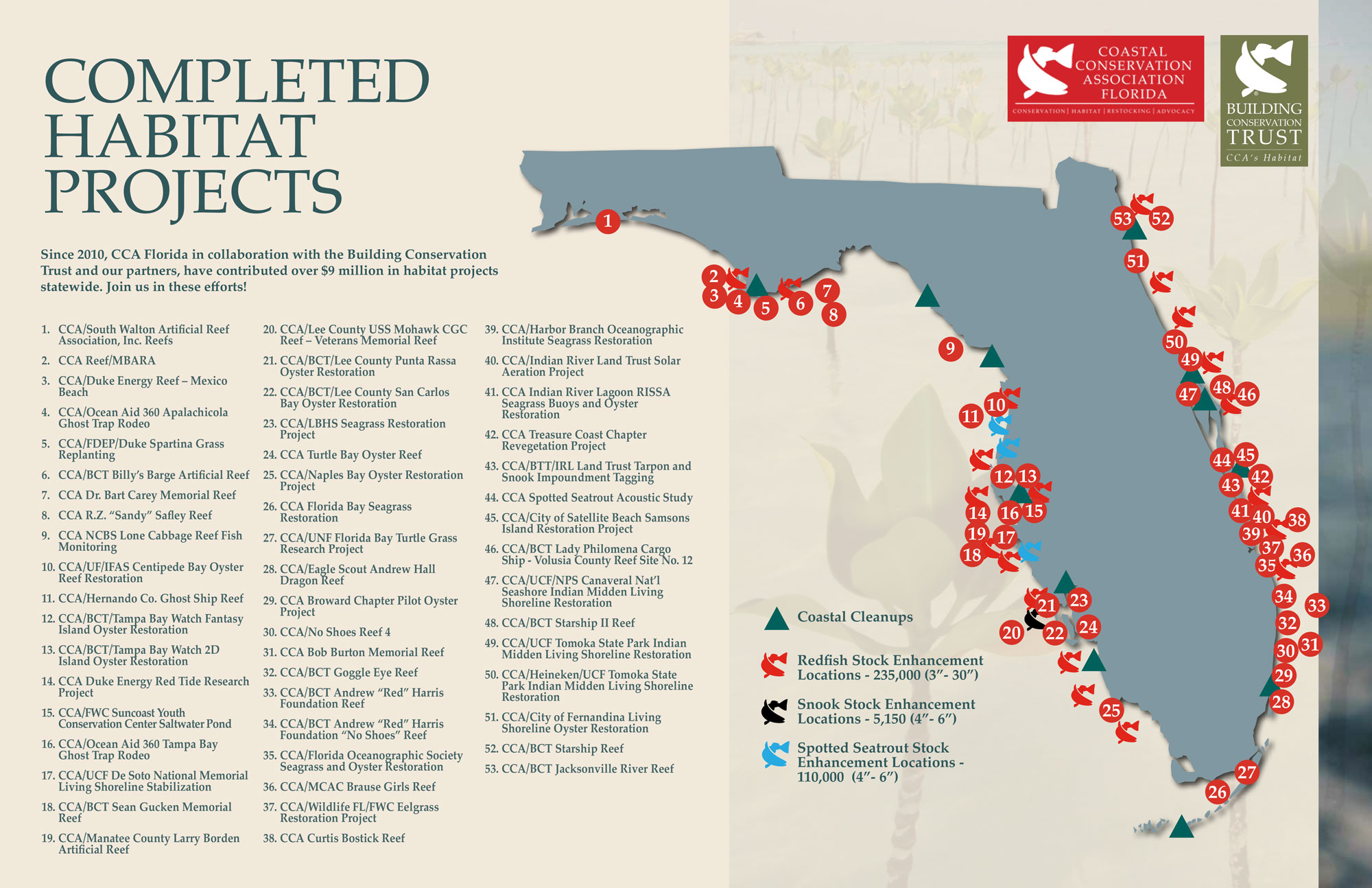2023 Habitat Update
Habitat Highlights
- Number of Ships Deployed on Artificial Reefs: 6.
- Concrete/Rock Deployed on Artificial Reefs: 7,072 tons.
- Number of Artificial Reefs Deployed: 43
- Recycled Oyster Shells Deployed: 75 tons.
- Shoreline Restoration: 3.5 miles.
- Number of Oyster Reefs Restored: 32.
- Number of Clams Deployed: 15,000,000+.
- Number of Spartina Grass and Mangroves Planted: 50,000.
- Amount of Trash Removed: 80 tons.
- Number of Trout Restocked: 50,000.
- Number of Snook Restocked: 5,150.
- Number of West Coast Redfish Restocked: 140,000.
- Number of East Coast Redfish Restocked: 86,000.
Since 2010 and in collaboration with the Building Conservation Trust, CCA Florida has contributed over $1.3 million and leveraged those funds with our partners to over $9 million in habitat projects statewide.
Completed and Ongoing Projects:
Bob Burton Memorial Reef – CCA Florida has been working with Diane Burton to honor her late husband with a memorial reef off Palm Beach County. Bob Burton was a CCA Life Member from Palm Beach, Florida. He also had a place in Chokoloskee and fished there quite a bit as well. Bob was one of the most active volunteers CCA has ever known. He served on a couple different fisheries management panels and would attend every CCA board meeting and pretty much every CCA statewide event. Everyone that knew Bob knew that if you fished with him, he would make you join CCA! Last year CCA received the approval from Palm Beach County to co-apply for the FWC artificial reef grant for this project. The grant application was submitted on April 22, 2022 and was awarded in August 2022. The deployment plan includes a large memorial structure that was built by a local marine artist, surrounded by several piles of large limestone boulders. The limestone boulders were deployed in early June 2023, and the memorial module was deployed on July 10, 2023. In addition to the $60,000 FWC grant funds received, CCA Florida has raised an additional $40,545 for this project.
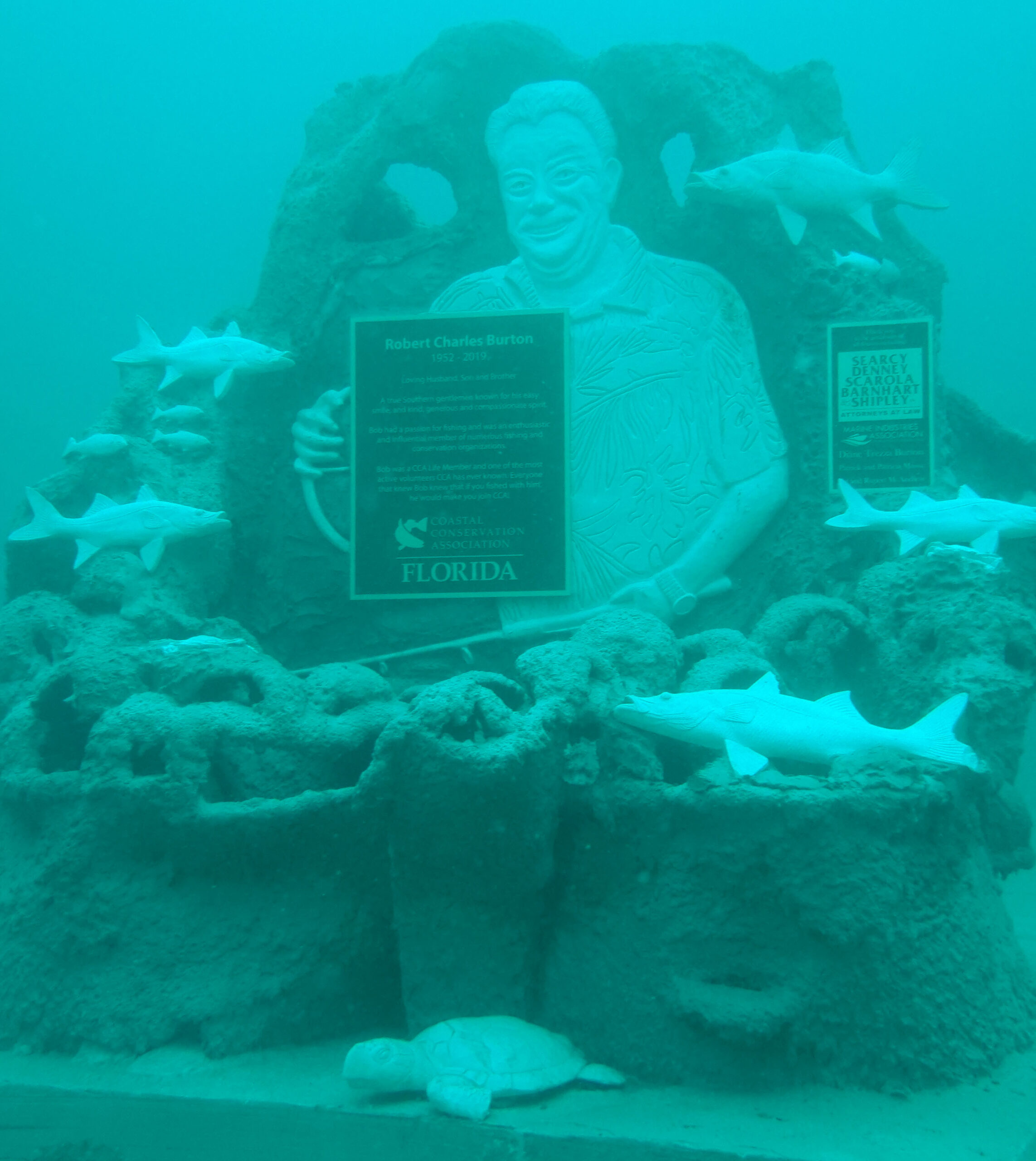
CCA/Duke/UF Living Shoreline Master Plan for Cedar Key Old Fenimore Mill – CCA Florida and Duke Energy collaborated with the University of Florida (UF) on a new living shoreline project in Cedar Key. Due to severe shoreline erosion near Old Fenimore Mill, a living shoreline stabilization project was proposed by UF. CCA Florida and Duke donated 250 reef balls, 100 mangroves and 900 large tufts of Spartina grass (Spartina patens) to the project valued at over $20,000. To date, the Spartina grass, mangroves and a few reef balls have been placed in a couple of different temporary locations but these have all been up the beach to try and capture sand, not in the final reef locations. Permits to place the actual reefs are still in progress and UF is awaiting the 60% design and the permitting process.
CCA Turtle Bay Oyster Reef 3rd Deployment – On May 25, 2023, CCA Florida completed its third deployment of the Turtle Bay Oyster Reef project by installing an additional 22.5 tons of recycled oyster shell to the site. Since 2021, a total of six dump trucks of CCA-recycled oyster shells have been deployed on the reef. Special thanks to Clermont Oyster Bar, Ingman Marine, Abbott Construction, Lee Reefs, Gasparilla Island Conservation and Improvement Association (GICIA), Capt. Jay Withers, Oyster Boys Conservation and Lake County for their continued support on this project. The oyster reef continues to boost water quality, enhance marine fisheries and improve recreational angling in Charlotte Harbor.
Cedar Key Coastal Cleanup – CCA Florida partnered with the Florida Department of Agriculture and Consumer Services, the Florida Department of Environmental Protection, the Florida Fish and Wildlife Conservation Commission, SeaGrant Florida, University of Florida, OceanAid 360, and the Cedar Key Aquaculture Association for a much-needed coastal cleanup in Cedar Key. The event will take place tomorrow, June 10, 2023 at the Cedar Key Marina. Boats are required and trash will be brought to an offshore barge and to an onshore dumpster near the marina.
CCA/Indian River Land Trust Impoundment Solar Aeration Project – CCA Florida has partnered with the Indian River Land Trust (IRLT) on efforts to improve Indian River Lagoon health and the health of iconic fish populations. To that end, we have been working towards modifications of management techniques in mosquito impoundments, which serve as important nursery habitat for juveniles of popular fish species such as tarpon and snook. During warmer months when the impoundments are isolated from the Indian River Lagoon and become stagnant, dropping oxygen levels and rising sulfide levels can become dangerous for fish and other aquatic organisms such as seagrasses. CCA Florida and the IRLT will undertake a pilot project that uses a solar-powered aerator in a Land Trust-owned impoundment to reduce stress on and prevent loss of fish and seagrasses.
Solar-powered aeration systems are pricey but are needed in remote areas without an available power source such as mosquito impoundments. A solar-powered aeration system that can treat up to 2 acres of open water using lengths of perforated tubing costs approximately $8,000. CCA Florida contributed $4,000 and the Indian River Land Trust matched that to get the project fully funded. The solar aeration system was installed on June 14, 2023. If this system proves its effectiveness within the impoundment, this technique can be used in other Land Trust-owned mosquito impoundments throughout the Lagoon in Indian River County to improve the health of important nursery habitats for fish and seagrasses that are threatened by poor water quality.
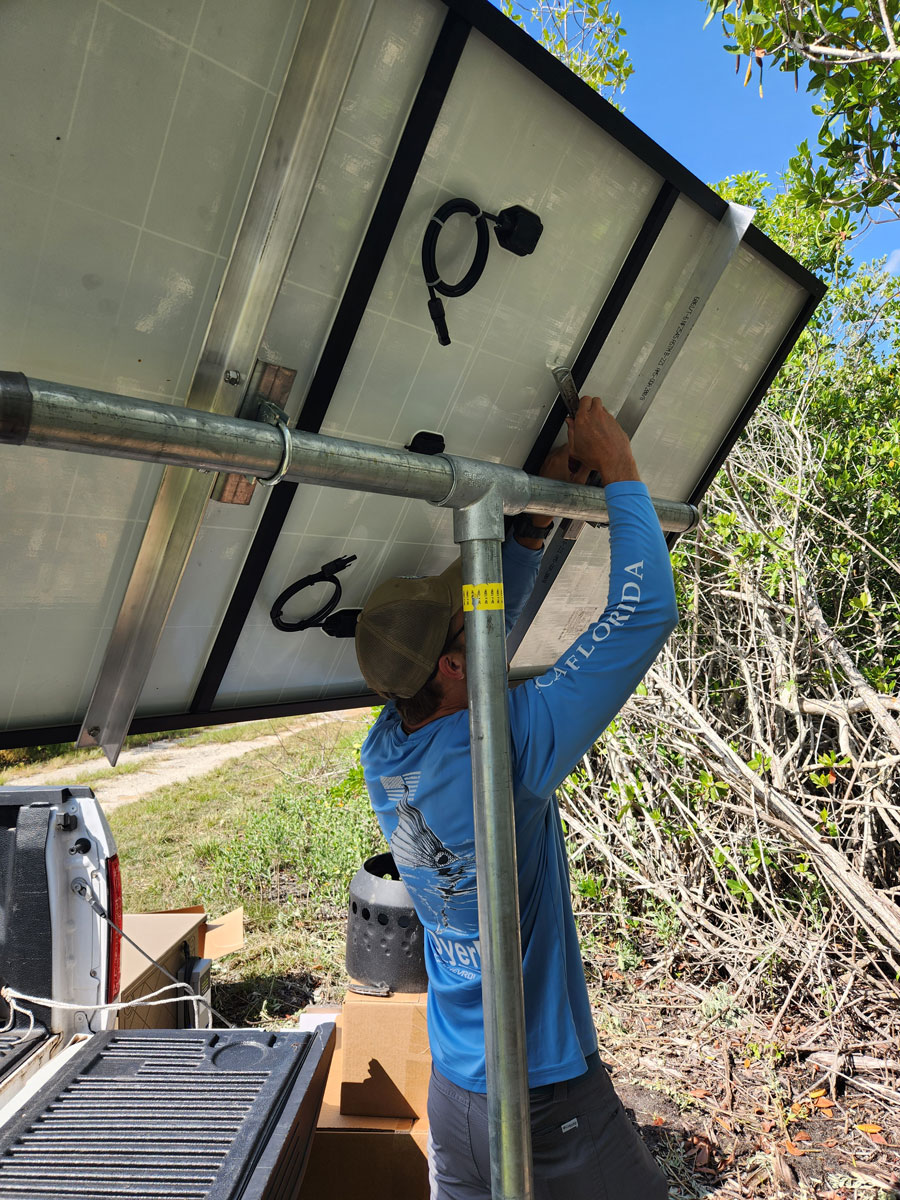
St. Joe Bay Sea Urchin Roundup – On May 6, 2023, CCA Florida partnered with FDEP’s Central Panhandle Aquatic Preserves, the Florida Fish and Wildlife Conservation Commission, and the St. Andrews and St. Joseph Bay Estuary Programs on a Sea Urchin Round Up on St. Joseph Bay. An overabundance of sea urchins (Lytechinus variegatus) continues to destroy turtle grass beds through overgrazing. The Round Ups involve volunteers (citizen scientists) assisting State-agency scientists collect and relocate sea urchins from active grazing fronts. The animals are collected and released in deeper areas of the bay at a distance from grazed areas. The weather was perfect and volunteers collected over 10,000 urchins! Stay tuned for details on another round up in September.
CCA/UNF Living Shoreline Oyster Reef Project – CCA Florida partnered with the University of North Florida (UNF) Coastal and Marine Biology program and the Northeast Florida Association of Realtors to develop an experimental “Living Shoreline – Oyster Reef” project in northeast Florida. This project is intended to rebuild historical populations of Eastern oysters by providing suitable habitat for oyster spat to settle and grow. The project began in May 2023 by constructing 18-24 cement-based substrates known as pervious oyster shell habitat (POSH) units. POSH units are similar to reef balls and castles, structures that are constructed from concrete and occasionally include small amounts of embedded oyster. These structures have been shown to be more effective in the development of living shorelines than typical alternatives, such as the use of recycled crab traps containing loose oyster shell, because they provide a greater amount of surface area for oysters to colonize.
The POSH units will be deployed later this year in sites where historic oyster beds once occurred within the University’s 1,050-acre property in the Atlantic Intracoastal Waterway, the William C. Webb Coastal Research Station. Following POSH deployment, UNF will conduct monthly monitoring to determine the rate of settlement of new oyster spat on the units. They will also conduct monthly assessments of sediment dynamics in front of and behind the structure to examine their effect on erosion as well as examining monthly changes in water quality and invertebrate/fish abundance. CCA Florida contributed $10,000 to the project for supplies/labor for the construction of the POSH units and monthly monitoring (boat use fees, fuel, supplies).
Brevard Zoo Titusville Seagrass Planting May 11, 2023 – CCA Florida joined the Brevard Zoo on May 11, 2023
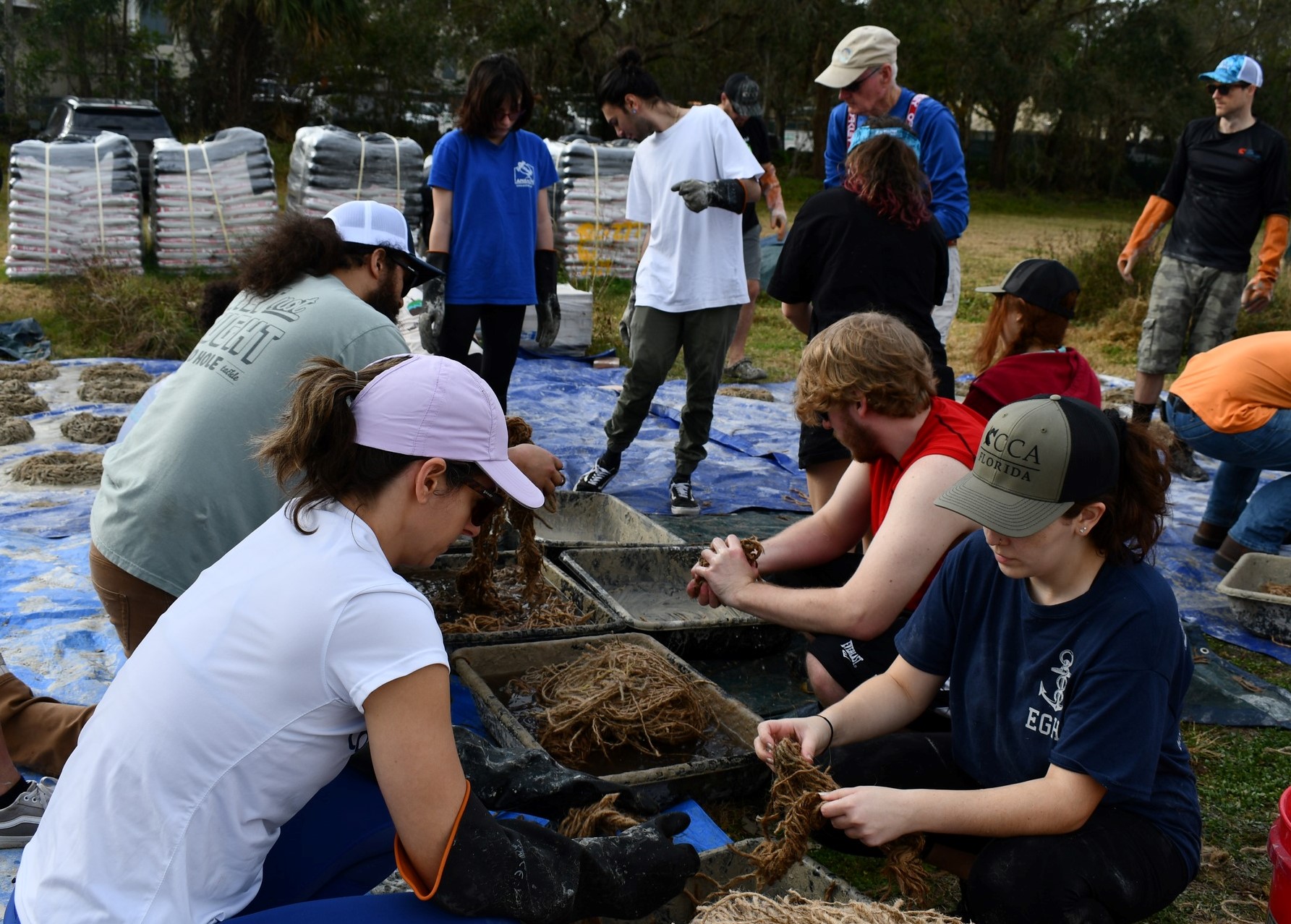
Indian River Lagoon (IRL) Clam Restoration Project – The IRL Clam Restoration Project began in 2017 and will continue indefinitely. CCA Florida originally partnered with the University of Florida, Addictive Fishing (Blair Wiggins Outdoors), and the Florida Fish and Wildlife Conservation Commission and together have deployed over 20 million clams in the IRL.
CCA/University of North Florida Restoration Project – CCA Florida is working with Dr. Kelly Smith, Associate Professor of the UNF Biology Department, on a joint CCA/UNF coastal oyster restoration and marsh restoration project. The project locations are Shell Bluff in St. Johns County, and Kingsley Plantation in Duval County. CCA Florida contributed $4,633, which included lift nets and fish monitoring supplies for this coastal wetland restoration project. In addition to the funding, CCA members worked with UNF on the construction of modules for the project. The oyster shells will be graded and collected at GTMNERR Middle Beach. The initial cement coating and POSH construction took place at UNF on July 6th and 7th. Deployment is planned in the spring 2023, and they have a group of inner city youth (the Green Team) who will assist in the deployment.
Ongoing Restoration in Mosquito Lagoon – CCA Florida is continuing its ongoing partnership with Dr. Linda Walters and the University of Central Florida (UCF) restoring oyster reefs and living shorelines in Mosquito Lagoon and the surrounding area. CCA Life Member and Habitat Committee Chairman Greg Harrison has been assisting UCF students and volunteers on a weekly basis. CCA Florida also recently donated a Power-Pole to the UCF Coastal and Estuarine Ecology Lab for use on one of their boats that is used for this restoration work.
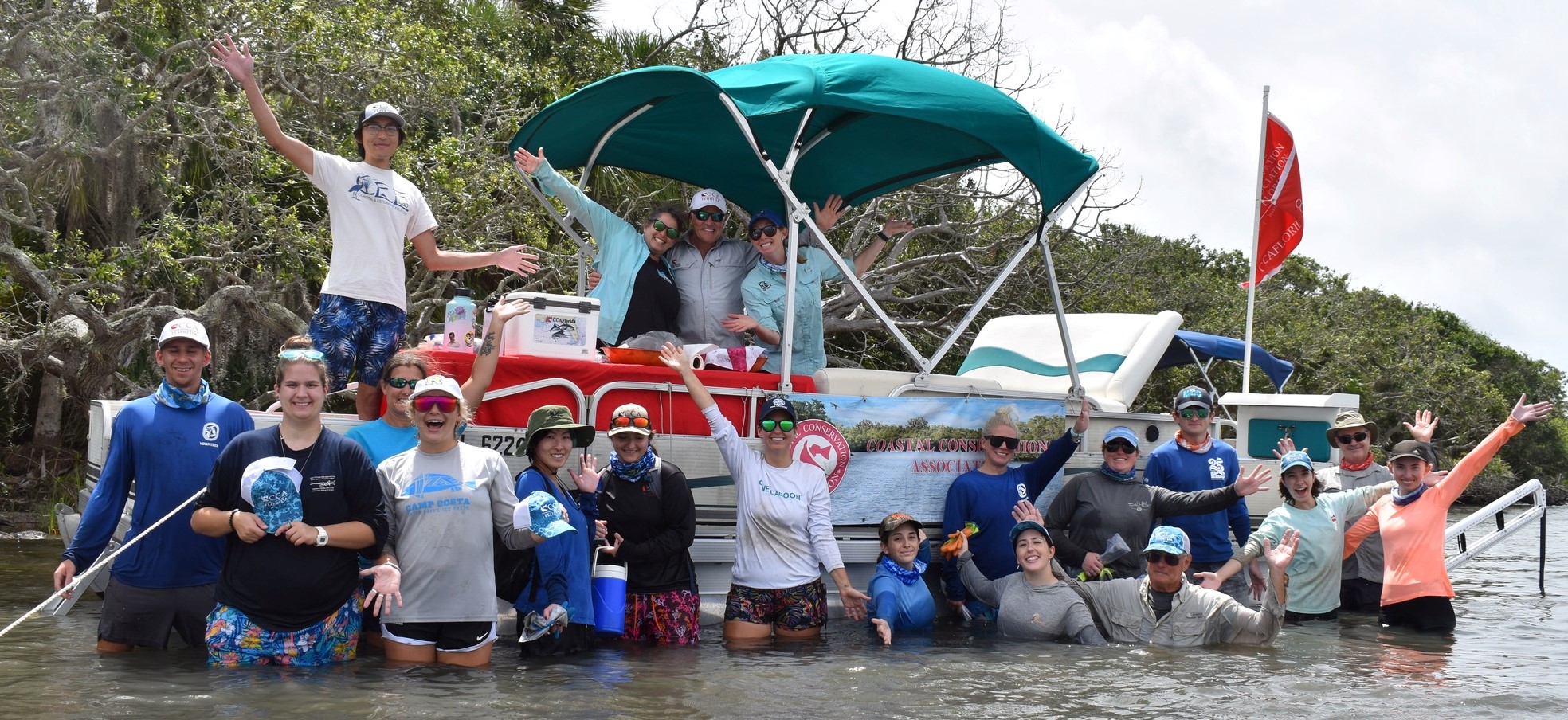
Brevard County Reefs – CCA Florida has an ongoing partnership with Brevard County to support their artificial reef program. Last year, CCA donated $3,000 to contribute toward their upcoming 2022 summer deployments. As in years past, CCA also wrote a grant support letter on behalf of Brevard County for an FWC artificial reef grant in which they were awarded funding. CCA Life Member Greg Harrison has been working on the Brevard artificial reef program for many years and has observed excellent invertebrate species growth on them as well as black sea bass, juvenile red snapper, crabs and large schools of baitfish. CCA again donated $3,000 to their reefing program in March 2023 deployment, along with another grant support letter to FWC.
Seagrass Restoration SW Fork of the Loxahatchee River – CCA Florida teamed with the Fish & Wildlife Foundation of Florida, the Florida Fish and Wildlife Conservation Commission, and Sea & Shoreline on a newly permitted pilot seagrass restoration project. The purpose of this project is to permanently restore 1.61 acres of native seagrass, consisting of Halodule wrightii and Ruppia maritima. The project is located in the Jonathan Dickinson State Park (Hobe Sound, FL) in the Northwest Fork of the Loxahatchee River, a tributary to the Indian River Lagoon (IRL). CCA Florida is contributing $29,360 to this $100,000 restoration project. An overview of the project tasks includes:
- Repair and add height to 13 existing fence pens to protect eelgrass from herbivory during higher water levels, especially during the months of September to November
- With FWC present, collect bare root eelgrass plants from Lake Echo and transport to Sea & Shoreline’s aquaculture facility for grow out and fabrication of 4” peat pot planting units
- Replant existing 13 fence pens with 4-inch peat pot plants
- Install patented GrowSAV Herbivory Exclusion Devices in remaining two fence areas
- Install eelgrass 4-inch peat pot planting units inside GrowSAV devices
- Install navigational aids surrounding GrowSAV devices
- Perform necessary maintenance of plants and GrowSAV devices for a one-year period
- Provide monitoring and reporting of project for a one-year period
Wildlife Florida/CCA IRL Eelgrass Restoration – CCA Florida partnered on a new eelgrass restoration project along the St. Lucie River with Wildlife Florida (STAR Sponsor) and FWC. A formal vote from the Habitat Committee voted in favor of funding $10,000 towards this project. On May 26, 2023, volunteers and staff from CCA planted the eelgrass in an oxbow off the St. Lucie River, as this area has slower moving water and has a lot of nice shallow areas for plants. FWC estimated that 0.35 acres was planted within the oxbow including 100 fence exclosures and 500 4” eelgrass pots. The eelgrass fence exclosures will stay in place for 3-6 months to prevent foraging and allow it to establish.
Sarasota Bay Watch Clam Restoration – This past summer, CCA Florida donated another $10,000 to Sarasota Bay Watch (SBW) to sponsor the restoration of 100,000 clams back into Sarasota Bay. This is the third year that CCA Florida has contributed to this program. SBW is working to restore clams and scallops to the bay with these important filter-feeders that play a critical role in mitigating poor water quality. They actually eat red tide and other algae, sequester carbon, filter up to 10 gallons of water per day, and provide food for other marine life. In total, each of the 300,000 clams are over 2-inches in size and according to Dr. Bruce Barber, Executive Director of the Gulf Shellfish Institute, a single 2-inch clam filters out 50,000,000 red tide organisms per day. That equates to 1 trillion organisms per day for the 300,000 clams.
Upcoming Projects:
Florida Keys Pennekamp Seagrass Restoration – CCA Florida and Sea & Shoreline, LLC recently successfully partnered on an $81,893 grant from NOAA’s Office of Habitat Conservation to restore habitat through the coastal National Fish Habitat Partnerships. Over the next year, CCA Florida and Sea & Shoreline will work with volunteers to restore damaged seagrass beds in John Pennekamp Coral Reef State Park, which borders the Florida Keys National Marine Sanctuary. The project goals include restoring the natural bathymetry to the impacted areas within the Park, enabling seagrass recolonization through the installation of sediment tubes, subsequent monitoring for three years, and launching an educational awareness campaign through community involvement. CCA Florida is also contributing a $75,000 match to the project to double the project restoration area.
St. Andrews Bay Seagrass Restoration – In February 2023, CCA Florida submitting a legislative funding request to the Florida House and Senate for a seagrass restoration project within the St. Andrews Aquatic Preserve (Preserve). This partnership project with Sea and Shoreline, LLC included a $999,496 funding request for permitting, seagrass cultivation/installation, sediment tube fabrication/installation, and annual monitoring/reporting for 3 years. The objective of this project is to install sediment tubes in moderate and severe propeller (prop) scars in the Preserve. Sediment tubes consist of biodegradable cotton filled with local sediments compatible with the surrounding substrate. They are placed inside scarred portions of seagrass meadows to raise the damaged areas up to ambient grade. Sediment tubes offer stabilization against potentially destructive forces such as waves, boat wakes, frequent storms, and currents. By stabilizing the scarred areas from these forces, seagrass from adjacent, non-damaged beds can naturally recruit into damaged areas. Research by the FWC has proven that sediment tube application in prop scars speeds recovery of seagrass regrowth in treated sites. Nursery cultivated seagrass planting units will also be used to complement the natural recovery afforded by sediment tube application in scarred beds. The funding request has been approved by both the House and Senate, and is awaiting the Governor’s signature.
Palm Beach County Impact 100 – In January 2021, CCA Florida submitted a grant application for $100,000 for a new artificial reef project, the Delray Dredge Hole Artificial Reef. On May 19, 2021, CCA was selected as the $100,000 grant award winner! CCA Florida, Palm Beach County, and Sandoway Discovery Center will be creating a new artificial reef less than a mile off the coast of Palm Beach County. The deployment site consists of a 31.5-acre area that has been inspected by divers and has received U.S. Army Corps of Engineers Permit No. SAJ-2018-01279 (SP-KAE). The deployment will consist of artificial reef modules created by a local marine artist deployed alongside natural limestone boulders. Deployment is tentatively scheduled for late 2023.
Tri-County Deep Stim III Vessel Deployment – CCA Florida has joined with a tri-county partnership including Okaloosa, Walton and Bay County to deploy a large vessel offshore. The 260-foot “DEEP STIM III” will be deployed at a depth of 125 feet and has 65 feet of relief. The total cost for the acquisition, cleaning towing (from Louisiana) is $750,000 and the 3 counties are splitting this cost. CCA Florida and BCT will be providing an additional $65,000 to cover the cost of the deployment, which will be performed by Reef Maker out of Orange Beach, Alabama. CCA Florida and BCT will have permanent metal signage at the top center of the bridge, and will also have banners on the vessel until deployment. The vessel will be deployed in the next 2-3 months.
CCA/Charlotte County Artificial Reef – CCA Florida is working with Charlotte County on a new potential concrete artificial reef project. Concrete materials consisting of manholes and culverts that were rejected from a $22,000,000 utility project are available and are currently stored on county property near I-75 and the Peace River. Two offshore permitted reef sites are available and include Palm Island Ferry Reef (55ft) and Jeff Steele Memorial Reef (60ft). Both permits are good through 2028.
Manatee County Larry Borden Reef – CCA Florida is working with Manatee County on a potential new artificial reef deployment in 2024. The existing Larry Borden Reef is a fairly new and highly productive fishing and diving reef located 7 miles west of the Longboat Pass Bridge. To date, only large limestone boulders have been deployed here including 575 tons in 2018 in which CCA contributed. However, next year the addition of concrete materials may be an option. CCA will also support the county on an FWC artificial reef grant application early next year for this project.
CCA Treasure Coast Living Docks Project – CCA Florida is working with the Florida Oceanographic Society (FOS) on a proposed living dock project in the Treasure Coast. The project would consist of tying recycled oyster shells onto mats and attaching them to dock pilings. FOS would first perform site assessments to pick a dock that will be ideal based on environmental characteristics such as water quality, salinity, tidal influence, etc. FOS will also apply for the state and federal permits. The proposed timeline is 3-6 months for site assessments and permitting, and the deployment is projected to be in the fall of 2023 or spring 2024.
CCA/Ducks Unlimited Partnership Projects – CCA Florida met with Ducks Unlimited (DU) in May 2023 to discuss 3 potential habitat project partnerships around the state. The first project consists of series of small projects involving pond connections and restoration in southwest Florida in conjunction with DU and the Bonefish Tarpon Trust. The second project consists of a proposed seagrass restoration project with DU and Sea & Shoreline, LLC. The purpose of this project is to restore six acres of seagrass, specifically widgeon grass, to a cover and density that allows its ecosystem services to occur. The proposed restoration project is located in the Indian River, adjacent to the Merritt Island National Wildlife Refuge. This would include a partnership grant application to the IRL National Estuary Program between DU, Sea & Shoreline, and CCA Florida. The third project consists of a hydrologic restoration project on the Lower Suwannee National Wildlife Refuge. It involves installing many culverts and Low Water Crossings across dirt timber roads to restore the landscape to the coast. The objective of the project is to focus on engineering measures to facilitate the natural flow exchange between fresh water from the refuge and the estuarine waters of Suwannee Sound to benefit and enhance ecological functions while maintaining road passage. The other main goal of the project is to reduce frequent road flooding in an effort to keep the roads open and to reduce long-term maintenance costs.
St. James City Oyster Gardening Project – CCA Florida recently donated recycled oyster shells to an oyster gardening project in St. James City in Southwest Florida. The oysters were delivered to our partners at Oyster Boys Conservation where they will be drilled and attached to ropes. 200 of these oyster ropes will be deployed off private docks in the St. James City neighborhood. CCA Florida is also looking into having a local university incorporate some research into the project. The oyster ropes should be deployed sometime this summer.
CCA Oyster Shell Recycling Expansion – CCA Florida recently received written approval from Lake County to move our existing oyster shell recycling program at the Lake County Landfill. Our oyster shell recycling program will be moved to an area with easier access and will also allow us to pave the area where the oysters will be stored and dried. DZ Block from Wildwood Florida will be donating 65 yards of concrete to the project. Concrete Worx/Steel Worx will be donating all labor, site work and finishing work. A ribbon cutting ceremony will take place with all of our project partners, Lake County Commissioners, and Rep. Daniel Webster.
Brevard County Reefs – CCA Florida is currently working with Brevard County Natural Resources Management Department on a new nearshore artificial reef 2.5 miles off the coast. They recently had the site surveyed and will begin permitting soon. More details will follow.
back to habitat restoration


